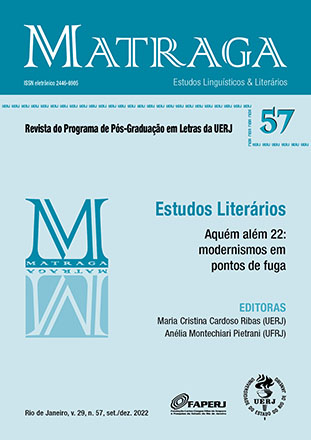Macunaíma: o prazer lúdico do texto
DOI:
https://doi.org/10.12957/matraga.2022.66086Palavras-chave:
Macunaíma, Mário de Andrade, Análise narrativa, Cômico popularResumo
O artigo analisa a importância da presença do elemento lúdico na composição do emblemático romance do Modernismo brasileiro, Macunaíma, o herói sem nenhum caráter (1928), de Mário de Andrade. Desenvolve o argumento segundo o qual o elemento lúdico confere coerência e verossimilhança ao texto, participando de todos os níveis da obra, desde suas origens – matéria-prima reescrita e reinventada por Mário de Andrade –, passando pela organização do sintagma narrativo, até a caracterização do herói, que pertence ao campo simbólico do romance. É ainda o componente lúdico que torna possível o riso ambivalente de Macunaíma, registrando no texto a dialética do sério-cômico (Telê Porto Ancona Lopez). A perspectiva adotada apoia-se na metodologia da análise narrativa de Gérard Genette, nos ensaios de Johan Huizinga e Mikhail Bakhtin que exploram, respectivamente, a presença do lúdico no mito e na poesia e a ambivalência do cômico popular, dialogando com a fortuna crítica do romance.
Downloads
Downloads
Publicado
Como Citar
Edição
Seção
Licença
AUTORIZAÇÃO
A Matraga – Revista do Programa de Pós-Graduação em Letras da UERJ está autorizada a publicar o artigo ora submetido, caso seja aceito para publicação online. Fica atestado que a contribuição é original, que não está sendo submetida a outro editor para publicação, e que a presente declaração é a expressão da verdade.
Os trabalhos publicados no espaço virtual da Matraga – Revista do Programa de Pós-Graduação em Letras da UERJ serão automaticamente cedidos, ficando os seus direitos autorais reservados à Matraga. Sua reprodução, total ou parcial, é condicionada à citação dos autores e dos dados da publicação.

A Matraga utiliza uma Licença Creative Commons - Atribuição-NãoComercial 4.0 Internacional.





